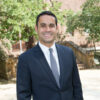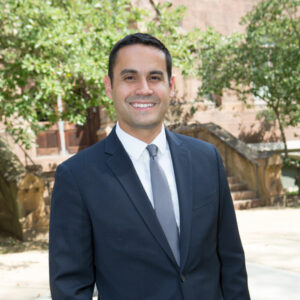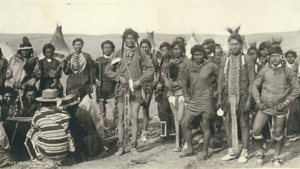Jesus’ first words in the Gospel of Mark do not appear until the 15th verse of the first chapter, and what he says is a definitive statement of what his mission is all about. At the same time, his first words are a bit enigmatic. Once we start thinking about he says, his mission statement may be not as clear as we would like.
Emerging from his baptismJesus was baptized (literally, "dipped") in the Jordan River by John the Baptizer, at which time he was acclaimed from heaven as God's Son, the Beloved. Much later baptism became one of the sacraments of the Church, the action by which a person is incorporated... More by John in the Jordan and his temptation by Satan in the wilderness, JesusJesus is the Messiah whose life, death, and resurrection are God's saving act for humanity. More inaugurates his ministry by saying, “The time is fulfilled, and the kingdom of GodThe kingdom (reign) of God is a central theme of Jesus' teaching and parables. According to Jesus this reign of God is a present reality and at the same time is yet to come. When Christians pray the Lord's Prayer, they ask that God's kingdom... More has come near; repentRepentance is a central biblical teaching. All people are sinful and God desires that all people repent of their sins. The Hebrew word for repent means to "turn away" from sin. The Greek word for repentance means to "change on'e mind," more specifically, it means... More, and believe in the good news” (Mark 1:15, italics added). The kingdom of God has come near. This clearly a momentous statement, but what is the kingdom of God exactly? How exactly has it drawn near in the ministry of Jesus? How has the time been fulfilled?
These are important but difficult questions to answer. In the Gospels, Jesus repeatedly speaks about but also lives into the tangible realities of this new existence. At the same time, a number of misconceptions often keep Christians today from appreciating fully the breadth and depth of this reality. What is the kingdom of God? Let’s start by asking what the kingdom is not?
THE KINGDOM OF GOD IS NOT JUST ABOUT HEAVEN
The first big misconception many Christians have about the kingdom of God is that Jesus is really talking about heaven. We often imagine that the kingdom of God is our eternal home after our deaths. However, the kingdom of God is not entirely about the future and neither is it a place, strictly speaking.
Jesus certainly spoke and taught much about the kingdom of God. But Jesus also demonstrates in tangible ways what the kingdom is. In healing others of their infirmities, Jesus brings us face-to-face with the kingdom right now, in the present. That is, Jesus does not just point to the heavens to talk about the kingdom of God. Jesus also points to real people in real difficulties and through their healing shows what the kingdom of God is like.
For example, Mark 5:24-34 records the story of the woman with the issue of blood. She had suffered for a long time due to this infirmity and had sought the help of physicians to no avail. For her, this disease is not just physical but relational. Her constant contact with blood made her spiritually uncleanIn Hebrew law many regulations warned against impurity. Unclean things were numerous and included leprosy, menstruating women, dead bodies, shell fish, and pigs. More, someone who could infect others with her spiritual infirmity. That is, her disease was a profound physical difficulty but also kept her from approaching others and even from approaching God in worship. Thus, her healing is certainly a physical, medical miracle. Even more miraculous, however, is how this healing transforms her life. She is no longer a social pariah. She no longer has to isolate herself from her neighbors and friends. She has truly been made whole. In fact, we could translate Mark 5:34 in this way: “Your faith has saved you.” Indeed, this moment of healing is a moment of salvationSalvation can mean saved from something (deliverance) or for something (redemption). Paul preached that salvation comes through the death of Christ on the cross which redeemed sinners from death and for a grace-filled life. More and justice.
That’s what the kingdom looks like here and now according to Jesus.
THE KINGDOM OF GOD IS NOT JUST A PLACE
Our language may limit us here. When we hear the word “kingdom,” we imagine an area of land or territory controlled by a royal official. And while this was certainly part of the ancient imagination that gave birth to the idea of “the kingdom of God,” it cannot fully encompass it. The kingdom is not a place, really. More important for the Gospel writers is the character of the kingdom. What is it like?
In order to include the character of the kingdom as well as avoid turning our minds to a kingdom with a particular locale, Mark Allan Powell’s preferred translation of the “reign of God” might be a really powerful way to think about the kingdom.[1] Instead of the kingdom of God leading us to think about what the place will be like, thinking about the “reign of God” might lead us to think more directly about the character of the God who would lead us.
If God were to be the dominant force in every aspect of our lives, more powerful than any political leader, healing all our ills, soothing every one of our emotional and physical wounds, what would the world be like? It is exactly this kind of kingdom or reign that Jesus invites us to imagine.
Then again, in some ways, it makes sense to speak of the kingdom of God as a place. Notice what LukeThe "beloved physician" and companion of Paul. More 17:20-21 says: “Once Jesus was asked by the Pharisees when the kingdom of God was coming, and he answered, “The kingdom of God is not coming with things that can be observed; nor will they say, ‘Look, here it is!’ or ‘There it is!’ For, in fact, the kingdom of God is among you.” The kingdom of God is found wherever and whenever God meets the gathering of the faithful. God has promised to meet us wherever we gather, whenever we call on God’s name.
This leads to a third misconception. Notice the tense of the tense of the last sentence in Luke 17:21. The verse does not say, “the kingdom of God will be among you.” Instead, Jesus promises the presence of the kingdom right now!
THE KINGDOM OF GOD IS NOT JUST ABOUT THE FUTURE
The kingdom of God in the Gospels is not just about the future. Like in Luke 17:20-21, Jesus speaks in the Sermon on the Mount about the present reality of the kingdom: “Blessed are the poor in spirit, for theirs is the kingdom of heaven. Blessed are those who are persecuted for righteousness’ sake, for theirs is the kingdom of heaven” (Matt 5:3, 10). Of course, other parts of the verses make promises rooted in future hopes. However, throughout the Gospels, there is a central confession that the kingdom of God has arrived with the advent of Jesus even if its complete fulfillment still awaits us in the future.
Luke 4:14-30 records Jesus’ first “sermon.” He enters the synagogueA synagogue is a Jewish house of worship. Jesus often taught in synagogues where he sometimes ran afoul of Jewish leaders. In the book of Acts, Paul and others attend synagogues and teach in them. More and reads a passage from IsaiahIsaiah, son of Amoz, who prophesied in Jerusalem, is included among the prophets of the eighth century BCE (along with Amos, Hosea, and Micah)--preachers who boldly proclaimed God's word of judgment against the economic, social, and religious disorders of their time. More: “The Spirit of the Lord is upon me, because he has anointed me to bring good news to the poor. He has sent me to proclaim release to the captives and recovery of sight to the blind, to let the oppressed go free, to proclaim the year of the Lord’s favor” (Luke 4:18-19). Jesus sits and then declares, “Today this scripture has been fulfilled in your hearing” (Luke 4:21). Today! Not tomorrow or sometime in the future but today!
Of course, the poor are still in our midst. Many of our neighbors are captive to any number of prisons and chains. The oppressed are still bound by injustice and cruelty. But Jesus’ promise is both an act of faith but also a call to action. We trust that God is reorienting the world around the reign of God, and we feel stirred by the Spirit to make that world a reality in collaboration with God.
It is not enough for those us who claim to follow Christ only to point to the kingdom with words. It is not enough to say to the poor and the oppressed that the kingdom will come. Christ calls us to proclaim the kingdom of God as powerfully present today and live into the world in faith that God is already creating that kingdom in our midst.
SO WHAT (WHERE) IS THE KINGDOM?
So what does the kingdom of God look like? God’s kingdom is when God alone rules and when God’s hopes for the world are fully present. God’s kingdom is present when people and communities are healed of their physical ailments but also those communal fractures that tear us apart. For Luke, the kingdom of God brings in its wake dramatic reversals. The poor are made rich. The hungry are fed. The weak are most powerful.
So where is the kingdom? The kingdom is here and everywhere. The kingdom of God comes to life whenever people of faith gather and call for God’s help. The kingdom of God is near if only we call out to the God who already reigns over us.
NOTES:
[1] See Mark Allan Powell, Fortress Introduction to the Gospels (Minneapolis: Augsburg Fortress, 1998), 50-52.






